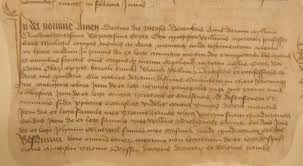THE WILL AND SOCIETY IN MEDIEVAL CATALONIA AND LANGUEDOC, 800-1200
Taylor, Nathaniel Lane
PhD Philosopy, Harvard University, Cambridge, Massachusetts, April (1995)
Abstract
Some three thousand men and women of Languedoc and Catalonia (southwestern France and northeastern Spain) from before the year 1200 speak to us through their testaments. This volume of testamentary evidence is unmatched in archives anywhere else in medieval Europe of the ninth through twelfth centuries. A comparative and focused analysis from over 3,000 surviving wills (amassed from diverse archival collections as well as hundreds of different published text editions) spans several parallel avenues of comparative and investigative history to illuminate the society of Catalonia and Languedoc in this period. A study of testaments and testamentary publication from Roman roots through the twelfth century explores the legal culture of the testaments using the methods and approaches of the new anthropology of law. Next, collective analysis of the testaments yields insights into social and family history. In addition to prosopographical information about the testators and economic data about the lands and goods bequeathed, the testaments reveal crucial changes in the custom of inheritance and patrimonial succession–changes which reflect (or underlie) the social transformations of the “feudal revolution” and its aftermath.
THE WILL AND SOCIETY IN MEDIEVAL CATALONIA AND LANGUEDOC, 800-1200
Taylor, Nathaniel Lane
PhD Philosopy, Harvard University, Cambridge, Massachusetts, April (1995)
Abstract
Some three thousand men and women of Languedoc and Catalonia (southwestern France and northeastern Spain) from before the year 1200 speak to us through their testaments. This volume of testamentary evidence is unmatched in archives anywhere else in medieval Europe of the ninth through twelfth centuries. A comparative and focused analysis from over 3,000 surviving wills (amassed from diverse archival collections as well as hundreds of different published text editions) spans several parallel avenues of comparative and investigative history to illuminate the society of Catalonia and Languedoc in this period. A study of testaments and testamentary publication from Roman roots through the twelfth century explores the legal culture of the testaments using the methods and approaches of the new anthropology of law. Next, collective analysis of the testaments yields insights into social and family history. In addition to prosopographical information about the testators and economic data about the lands and goods bequeathed, the testaments reveal crucial changes in the custom of inheritance and patrimonial succession–changes which reflect (or underlie) the social transformations of the “feudal revolution” and its aftermath.
this period. A study of testaments and testamentary publication from Roman roots through the twelfth century explores the legal culture of the testaments using the methods and approaches of the new anthropology of law. Next, collective analysis of the testaments yields insights into social and family history. In addition to prosopographical information about the testators and economic data about the lands and goods bequeathed, the testaments reveal crucial changes in the custom of inheritance and patrimonial succession–changes which reflect (or underlie) the social transformations of the “feudal revolution” and its aftermath.
Click here to read this thesis from Harvard University
Subscribe to Medievalverse
Related Posts